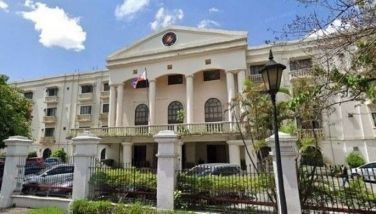Asean member-states form quick-reaction diplomacy group
It also adopted a framework on counter-terrorism, officials said.
Ministers at the 27-member ASEAN Regional Forum (ARF) adopted operating rules for the rapid-response group, called “Friends of the ARF Chair,” and endorsed a Cooperation Framework on Counter-terrorism and Transnational Crime.
“Now ARF has a mechanism to perform preventive diplomacy work,” said M.C. Abad, an ARF official.
“ARF will not just be conference diplomacy. It will have a mechanism to do things that cannot wait for the next meeting.”
The cooperation framework, which covers 11 areas including transport security, information exchange and management of the impact of terrorist acts, gives ARF a “comprehensive and coherent program of work in the field of counter-terrorism and transnational crimes,” he added.
The “Friends of the ARF Chair” – three foreign ministers who will assist the ARF chairman in dealing with regional and international problems – is an ad hoc group that will be set up by the ARF chairman for specific tasks, such as in times of emergency and threats to regional peace and stability.
The ARF, founded in 1994 by the 10-nation Association of Southeast Asian Nations (ASEAN), is hobbled by the diversity of its members and its consensus-based decision-making. Since its birth, it has focused on building trust among its members through dialogue and confidence-building measures. Some have criticized it as doing more talk than action.
ASEAN Secretary-General Ong Keng Yong defended the forum, saying ARF participants are diverse “and we therefore have to talk a lot to get our mutual trust.”
“Once we get our mutual trust, then we build our projects and programs, and that will not be difficult,” he added.
Abad said ARF’s measured steps spring from different perceptions of security challenges and therefore different priorities. When solutions are arrived at, there are different capabilities to respond, he added.
“First we must agree on perception, common readings,” he said.
“This requires continuous consultations, persistence and commitment to find solutions to these challenges.”
Ong said the group is just starting to go into preventive diplomacy and hopes to build on experiences in the region, such as in
The
Hill, who arrived in
During the ARF meeting at the Philippine International Convention Center (PICC), Hill told the delegates of the need to “really pick up the pace” on institutionalizing joint cooperation, especially in times of calamities and disasters.
He said the
Hill noted that
He said casualties could have been reduced had there been quick humanitarian response in place.
A US State Department paper said the
He said during the massive tsunami that hit
He said the
Hill added the Philippines and the US have done a lot together in the area of disaster management bilaterally and “I think it’s time to take the knowledge we have in working bilaterally and try to apply it multilaterally in the ARF.”
Condemnations
At the conclusion of the ARF, member states condemned the Taliban for killing two South Korean hostages and demanded that the 21 others be released immediately.
Behind closed doors there were also pointed warnings from
“The Foreign Ministers of the participating countries of the ASEAN Regional Forum express our solidarity with the people and government of the Republic of Korea and condemn the hostage taking of their nationals in Afghanistan and deplore in the strongest terms the brutal murder of two hostages,” the statement, read by ARF chairman Foreign Affairs Secretary Alberto Romulo, said.
The ministers said they “share the grief and sorrow of the family and friends of the murder victims and the concern and heartache of the loved ones of the hostages.”
“We express hope that the hostages and their families will find the strength to face this ordeal, while at the same time expressing the hope that they will soon be reunited,” the statement said.
The statement was issued a day after Taliban insurgents shot dead a second South Korean hostage in
The Taliban accused the Afghan government and South Korean negotiators of failing to act in good faith after
- Latest
- Trending































